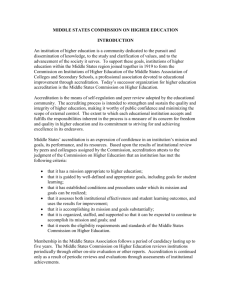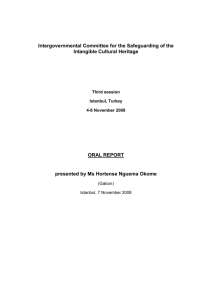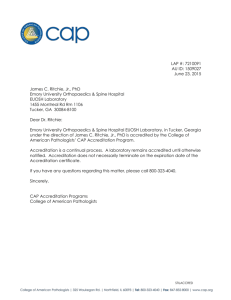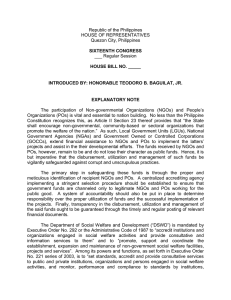ITH/12/7.COM/16.b – page 1 CONVENTION FOR THE
advertisement
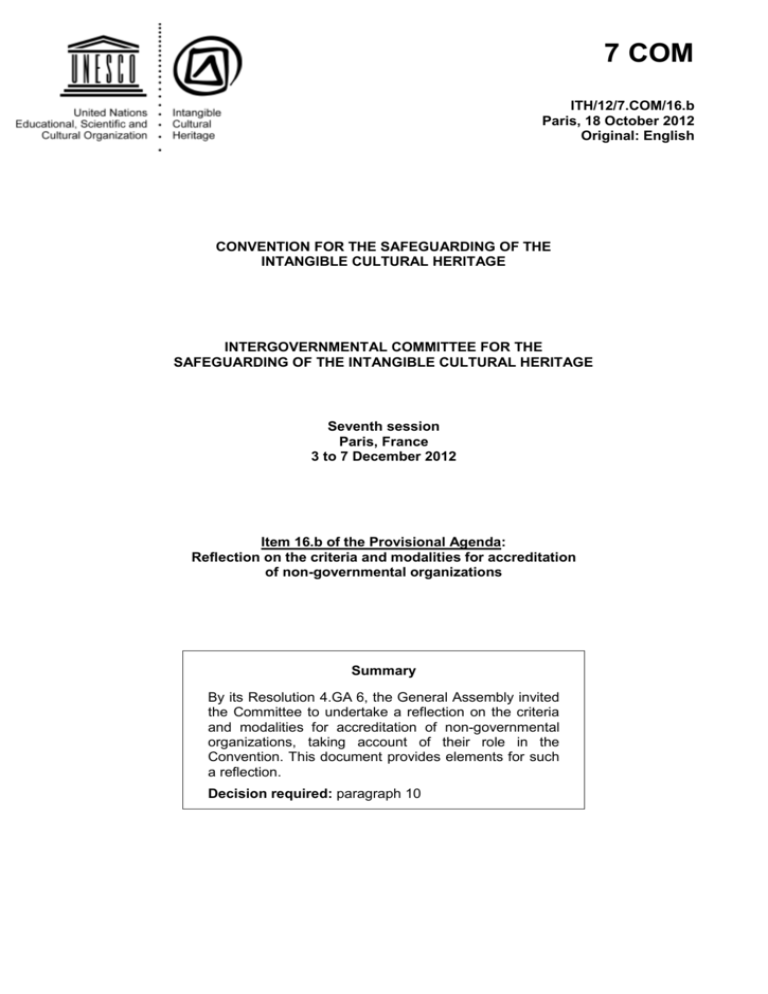
7 COM ITH/12/7.COM/16.b Paris, 18 October 2012 Original: English CONVENTION FOR THE SAFEGUARDING OF THE INTANGIBLE CULTURAL HERITAGE INTERGOVERNMENTAL COMMITTEE FOR THE SAFEGUARDING OF THE INTANGIBLE CULTURAL HERITAGE Seventh session Paris, France 3 to 7 December 2012 Item 16.b of the Provisional Agenda: Reflection on the criteria and modalities for accreditation of non-governmental organizations Summary By its Resolution 4.GA 6, the General Assembly invited the Committee to undertake a reflection on the criteria and modalities for accreditation of non-governmental organizations, taking account of their role in the Convention. This document provides elements for such a reflection. Decision required: paragraph 10 ITH/12/7.COM/16.b – page 2 1. The Convention accords an important role to non-governmental organizations (NGOs), specifically in Article 9 referring to accreditation of such organizations to act in an advisory capacity to the Committee and Article 11(b) obliging States Parties to involve relevant NGOs in the implementation of the Convention at the national level. In conformity with Article 11(b), paragraph 90 of the Operational Directives provides that States Parties shall involve relevant NGOs in a wide range of activities, including identification and definition of intangible cultural heritage and other safeguarding measures. NGOs can also play a key role in ensuring respect for the intangible cultural heritage and in raising awareness at the local, national and international levels of its importance. 2. Chapter III.2.2 of the Operational Directives treats the participation of accredited NGOs in the Committee’s work, including the criteria for their accreditation (paragraph 91), the modalities and review of accreditation (paragraphs 92-95), their advisory functions (paragraph 96) and the procedures for accreditation (paragraphs 97-99). 3. Those Operational Directives concerning accreditation, procedures and functions of nongovernmental organizations were debated by the Committee over the course of several meetings (1.COM, 1.EXT.COM, 2.COM) and were adopted by the General Assembly in its second session in 2008 (Resolution 2.GA 5). A substantially clearer vision of the specific advisory functions of NGOs emerged only later, with the subsequent adoption by the General Assembly of paragraph 26 of the Operational Directives concerning the tasks of the Consultative Body (initially established on an experimental basis at 3.GA and reconfirmed at 4.GA). Paragraph 26 describes the membership of accredited NGOs in the Consultative Body charged with evaluating nominations to the Urgent Safeguarding List, proposals for the Register of Best Safeguarding Practices and requests for International Assistance greater than US$25,000 and with providing recommendations to the Committee concerning such files. It also recalls the need to take into consideration equitable geographical representation and various domains of intangible cultural heritage in the selection of its membership. 4. The purpose of accreditation of NGOs, as set out in Article 9 of the Convention, is so that they may ‘act in advisory capacity to the Committee’. With the emerging clarity on the nature and modality of those advisory functions within the Consultative Body, the Committee may wish to consider whether the criteria for accreditation are well-adapted to the specific functions set out in paragraphs 26 and 96 of the Operational Directives. 5. To date, the General Assembly has accredited 156 organizations fulfilling the current criteria (97 in 2010, by its Resolution 3.GA 7, and 59 in 2012, by its Resolution 4.GA 6). Although most of those NGOs are carrying out extremely important work on the safeguarding of intangible cultural heritage at the local, national or international levels, a substantial proportion do not have the required competencies and skills to carry out the evaluation work described in the Operational Directives. The General Assembly, Committee and Secretariat nevertheless expend a significant amount of time on the process of accrediting a large number of organizations that are unlikely ever to be called upon for advisory services. 6. The evaluation of nominations, proposals and requests requires a very good command of at least one of the two working languages, English or French, strong analytical skills, capacity to draft synthetic texts and ability to work across several domains of intangible cultural heritage. Experience at the international level or the capacity to extrapolate from local experience to apply it within an international context is also essential to the work of evaluation. However, many among the accredited NGOs are small or medium-sized organizations specialized in safeguarding particular intangible cultural heritage elements and/or working at the local community level. They may be very effective at those functions without necessarily possessing the specific skills that would be needed to evaluate files for the Committee. At the same time, their effectiveness in safeguarding at the local level and their contribution to the implementation of the Convention does not depend on their accreditation to act in an advisory capacity to the Committee. 7. It is also important to recall that, as stated in Rule 8.3 of its Rules of Procedure, the Committee may authorize non-governmental organizations with recognized competence in ITH/12/7.COM/16.b – page 3 intangible cultural heritage to attend the Committee meetings as observers upon written request, and thus all NGOs that wish to do so can bring their valuable contribution to the work of the Committee by participating in this capacity. As observers, they are invited to the Committee sessions and may intervene in its debates, regardless of whether or not they are accredited. 8. The Committee may also wish to give attention to the definition of a non-governmental organization. According to the ‘Directives concerning UNESCO’s partnership with nongovernmental organizations’, adopted by the 36th session of the General Conference, ‘any organization may qualify as a non-governmental organization [...] provided that it has not been established by intergovernmental agreement, or by a government, and that its purposes, functions, structure and operation are non-governmental, democratic and nonprofit-making in character’ (36 C/Resolution 108). The Secretariat has received a number of requests for accreditation from government-established organizations or organizations with public legal personality such as academic research institutes, centres of expertise or specialized training institutions, some of which have nevertheless insisted on their ‘nongovernmental’ status. The Committee may wish to incorporate the General Conference’s definition of a non-governmental organization should it decide to propose revised criteria for accreditation to the General Assembly. 9. If the Committee were to adopt revised Operational Directives concerning the accreditation of NGOs at its eighth session in late 2013, these could be submitted, for possible adoption, to the fifth session of the General Assembly in mid-2014. The 97 NGOs accredited in 2010 will be reviewed by the Committee beginning in 2014 (paragraph 94 of the Operational Directives), and it would thus be possible for that review process to reflect the revised criteria, if they are adopted by 5.GA. 10. The Committee may wish to adopt the following decision: DRAFT DECISION 7.COM 16.b The Committee, 1. Having examined Document ITH/12/7.COM/16.b, 2. Recalling Article 9 of the Convention, Chapter III.2 of the Operational Directives and Rule 8.3 of the Rules of Procedure of the Intergovernmental Committee, 3. Further recalling Resolution 4.GA 6, 4. Takes note of the important contributions that numerous non-governmental organizations make world-wide to the implementation of the Convention at the local, national and international levels and recalls that States Parties shall involve the relevant non-governmental organizations in the implementation of the Convention, inter alia in identifying and defining intangible cultural heritage and in other appropriate safeguarding measures; 5. Takes further note of the limited opportunities for non-governmental organizations to act in an advisory capacity to the Committee; 6. Requests the Secretariat to propose for its consideration at its eighth session a draft set of revised Operational Directives for the criteria and modalities for accreditation of non-governmental organizations, taking account of their role in the Convention and the necessity of equitable geographical representation, and reflecting its present debates.
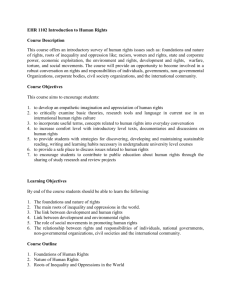


![Structure Operational Directives [Article 7(e)]](http://s3.studylib.net/store/data/007343567_1-f0ac6942f9a623f9ff0cf296a6ab024d-300x300.png)

